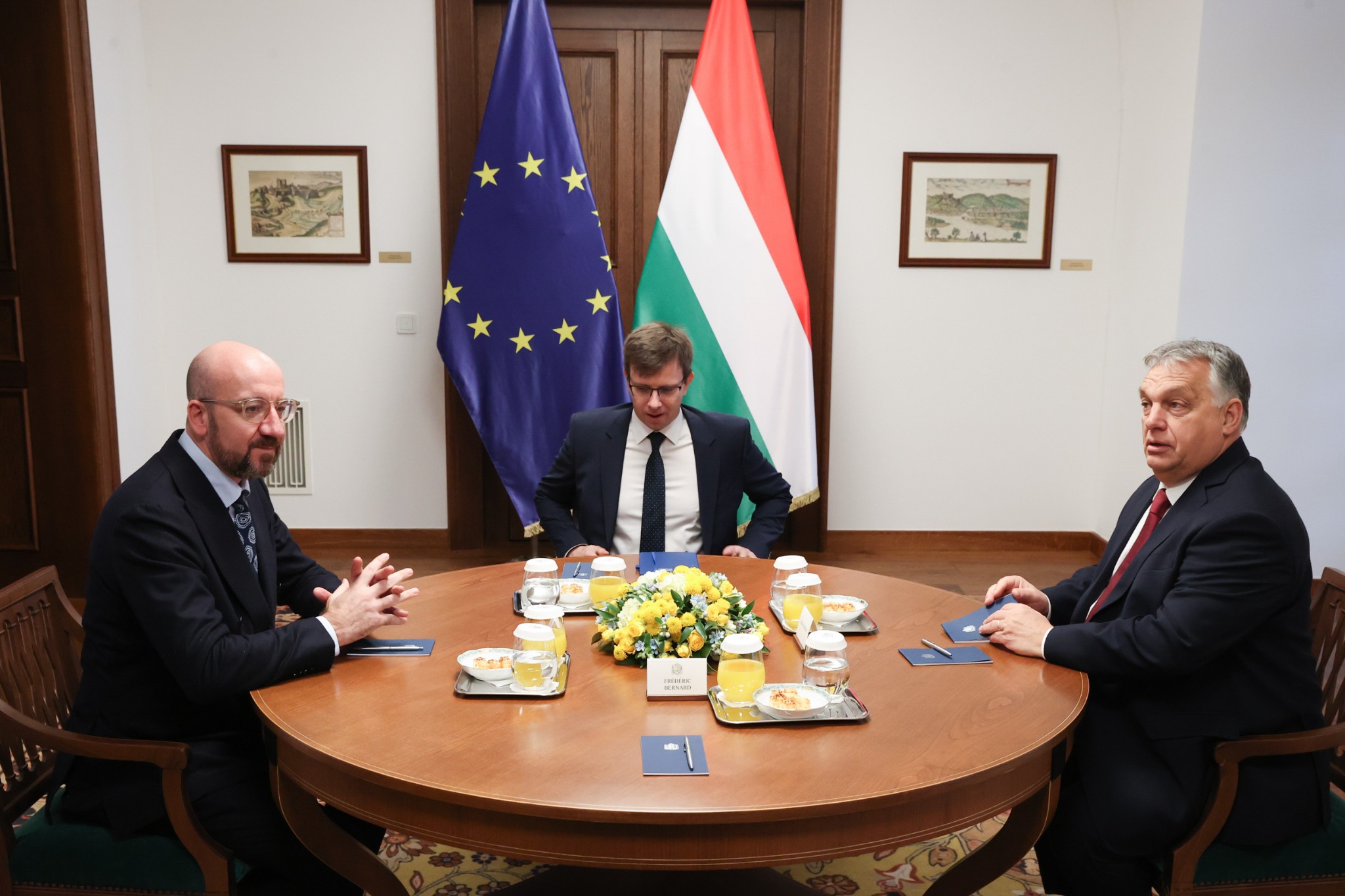 Hungarian Prime Minister Viktor Orbán meets with President of the European Council Charles Michel, November 27, 2023. Image courtesy European Council.
Hungarian Prime Minister Viktor Orbán meets with President of the European Council Charles Michel, November 27, 2023. Image courtesy European Council.
The U.S. Needs to Address Orbán’s Hostilities on Ukraine Aid
Last Thursday, the European Council in the European Union agreed to provide a €54 billion aid package to Ukraine after Hungarian Prime Minister Viktor Orbán initially blocked its approval. This blockade followed the European Commission’s (EC) withholding of €22 billion in European Union Cohesion Fund assistance in 2022 over Orbán’s subversion of judicial independence and democratic elections.
Orbán’s gamesmanship over Ukraine aid threatens to undermine European and American security interests by fragmenting unity against the most serious threat to the European continent since the Cold War. If the United States expects Europe to rightfully pick up more of the burden for its own defense, it must set an example and overcome its own challenges with political gamesmanship to support Ukraine.
Orbán’s Tumultuous Relationship with the European Union
After becoming Prime Minister in 2010 on an anti-European Union platform, Orbán has maintained a tumultuous relationship with the European Union. Such conflict has centered around Orbán’s contravention of European Union law surrounding the commitment to protect his nation’s democratic institutions.
In 2012 and 2013, Orbán first drew the ire of the European Union by introducing changes to the Fundamental Law of Hungary, the nation’s constitution, that curbed the power of the Hungarian Constitutional Court to review substantive provisions of the constitution. These changes resulted in the forced retirement of independent judges and consolidation of media networks to benefit his Fidesz party, sparking an infringement proceeding from the European Court of Justice (ECJ).
Emboldened by his party’s accumulation of power, Orbán continued defying the European Union. In 2015, Hungary opposed the European Union-led resettlement of Middle Eastern migrants, violating European Union laws by moving migrants along Hungarian borders into neighboring countries without due process. After Hungary further institutionalized partisan gerrymandering in 2018, the European Parliament (EP) invoked the Maastricht Treaty’s Article 7 to determine whether Hungary should be sanctioned or removed from the European Union based on Orbán’s violations of democratic values outlined in Article 2. After Orbán blocked the Ukraine aid package, European Commissioner for Justice Didier Reynders called on the EP to conclude the “existence of a serious and persistent breach” of fundamental rights in Hungary, which would open the door to activating a vote on the use of the European Union’s suspension clause against Hungary.
How Hungary’s European Union Antagonism Threatens American Security Interests
Orbán’s aggravation of the European Union culminated in his blockade of European Union aid to Ukraine. In July 2023, The EC referred Hungary to the ECJ for violations of the Treaty on the Functioning of the European Union surrounding Hungary’s fixing prices for building materials beyond its regulations. Combined with the EC withholding Cohesion Fund assistance, Orbán grew aggravated, accusing the European Union of “blackmailing” Hungary and attempting to dictate the terms of the European Union’s agenda.
Orbán’s blockade directly benefits Russia’s position in its invasion of Ukraine. As an ally of Russian President Vladimir Putin, Orbán maintains an economic alliance with Russia. Hungary is dependent on Russia for energy imports. In October 2023, Russian state-owned Gazprom announced it would export 1.3 billion additional cubic meters of natural gas to Hungary during winter seasons. Although Hungary depends on European Union countries’ imports to support its economy, Hungary’s deepening ties with Russia have allowed it to defy the European Union and compensate for potential pitfalls.
Orbán’s obstruction over Ukraine aid pairs with his obstruction of NATO’s support for Ukraine. After conditionally agreeing to support Sweden’s accession to the North Atlantic Treaty Organization, Fidesz leaders on Monday boycotted an emergency session of Parliament where a vote was scheduled for Sweden’s accession.
Orbán’s gamesmanship undermines short-term and long-term American security interests. Ukrainian President Volodymyr Zelenskyy has warned that a successful Russian offensive through Ukraine would encourage Putin to prepare for potential incursions against American allies surrounding Ukraine. This possibility risks a massive escalation that various European leaders have warned ould result in indiscriminate warfare resulting in mass casualties and the destabilization of the Western democratic alliance.
Conclusion
In totality, Orbán’s determination to leverage its alliance with Russia over Ukraine aid puts American security interests at risk. Subsequently, Orbán’s leveraging of vital Ukraine aid that is necessary for protecting the freedom of democratic allies to extract unrelated political concessions must not become normalized behavior. To assist Ukraine and preserve the integrity of Europe, the United States needs to encourage even greater European assistance and cohesion, but it is unable to do so without straightening out its own political gamesmanship at home. On Tuesday, Senate Republicans blocked a bipartisan bill that tied significant increases in border security measures to Ukraine aid despite insisting on this model for moving Ukrainian aid forward. Instead of playing politics and normalizing acquiescence to Russian expansionism, Congress needs to take up the mantle of indispensable American leadership, set an example, and unite its allies to protect our shared interests.





